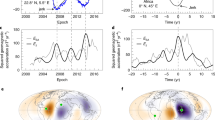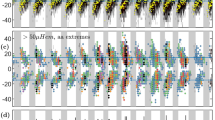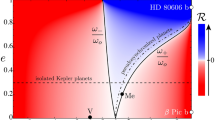Abstract
A CURIOUS and hitherto unexplained phenomenon was discovered many years ago by Sangster1 from a study of Greenwich magnetograms for periods of magnetic disturbance. He showed that the horizontal component of the disturbance vector at Greenwich rotates for considerable periods in the same direction, so that its end describes a sequence of loops, which vary greatly in size and shape but are all described in the same sense, when viewed, say, from above. From 10h. to 24h. almost all the rotations are anticlockwise, while from 0h. to 10h. they are mostly clockwise.
This is a preview of subscription content, access via your institution
Access options
Subscribe to this journal
Receive 51 print issues and online access
$199.00 per year
only $3.90 per issue
Buy this article
- Purchase on Springer Link
- Instant access to full article PDF
Prices may be subject to local taxes which are calculated during checkout
Similar content being viewed by others
References
Proc. Roy. Soc., A, 84, 85 (1910).
Met. Z., 16, 385 (1899); see also Chapman and Bartels, "Geomagnetism", 311.
Author information
Authors and Affiliations
Rights and permissions
About this article
Cite this article
PRICE, A. A Suggested Explanation of Sangster‘s Rotations and Schmidt‘s "Wandering Vortices" in Geomagnetism. Nature 162, 110–111 (1948). https://doi.org/10.1038/162110a0
Issue Date:
DOI: https://doi.org/10.1038/162110a0
Comments
By submitting a comment you agree to abide by our Terms and Community Guidelines. If you find something abusive or that does not comply with our terms or guidelines please flag it as inappropriate.



